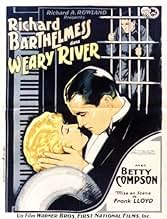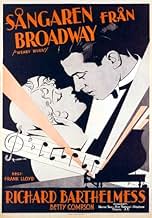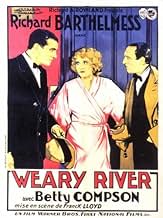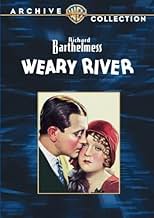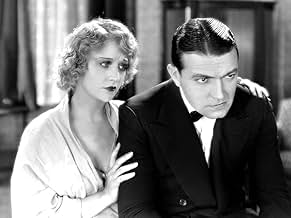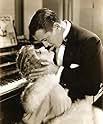Füge eine Handlung in deiner Sprache hinzuA gangster is put in prison, but finds salvation through music while serving his time. Again on the outside, he finds success elusive and temptations abound.A gangster is put in prison, but finds salvation through music while serving his time. Again on the outside, he finds success elusive and temptations abound.A gangster is put in prison, but finds salvation through music while serving his time. Again on the outside, he finds success elusive and temptations abound.
- Für 1 Oscar nominiert
- 2 Gewinne & 1 Nominierung insgesamt
George E. Stone
- Blackie
- (as George Stone)
Ray Turner
- Elevator Boy
- (as Raymond Turner)
Ernie Adams
- Ex-Con in Alley
- (Nicht genannt)
Brooks Benedict
- Jerry's Guest
- (Nicht genannt)
Ruth Cherrington
- Actress Backstage Who Locks Her Door
- (Nicht genannt)
James Conaty
- Attorney at Trial
- (Nicht genannt)
Richard Cramer
- Prison Radio Announcer
- (Nicht genannt)
Oliver Cross
- Restaurant Patron
- (Nicht genannt)
Edwards Davis
- Prison Chaplain
- (Nicht genannt)
Sally Eilers
- Hatcheck Girl
- (Nicht genannt)
Jim Farley
- Plainclothesman with Sergeant
- (Nicht genannt)
Sherry Hall
- Prison Phone Operator
- (Nicht genannt)
Chuck Hamilton
- Prison Photographer
- (Nicht genannt)
Empfohlene Bewertungen
Singing gangster Richard Barthelmess (as Jerry Larrabee) is sent "up the river" after an innocent bystander is killed in one of his orchestrated shoot 'em ups. In prison, Mr. Barthelmess (#46039) has more time for singing and less time for racketeering. He becomes a hit in the big house and decides to go straight on the outside. But, after serving his time, Barthelmess receives a rocky reception. While a wonderful singer, he's derided as an ex-con. Through it all, Barthelmess is encouraged by beautiful blonde Betty Compson (as Alice Gray). She and warden William Holden would like Barthelmess to keep trying, but he is tempted by his criminal past...
"Weary River" is a part-talking, part-silent film. It begins as a silent, with oddly primitive background music (for 1929), and turns "talkie" early in the running time. You're thinking it will remain there, but the silent style occasionally returns. Perhaps the soundtrack on these scenes was inferior and re-takes unsatisfactory. While mostly a sound film, the spirit is silent; this may be why the technology appears superior to many other early talkies. The possibly better all-silent version should be restored, if possible...
Then a very big star, Barthelmess maintained his standing during the transition from silent to sound. His voice was fine, but Barthelmess is obviously better in the older style. Barthelmess also mouths his songs for a vocal double. Taken from this film, the song "Weary River" was a big hit for the popular new singer Rudy Vallee. Randolph Scott and Sally Eilers are extras and elevator "boy" Raymond Turner looks frightened. Director Frank Lloyd's artful prison sequences require no dialogue, and photographer Ernie Haller is an obvious asset. Their assistant Alvin Knechtel was killed in a plane crash, sadly, on the verge of a promising career.
***** Weary River (2/10/29) Frank Lloyd ~ Richard Barthelmess, Betty Compson, William Holden, Louis Natheaux
"Weary River" is a part-talking, part-silent film. It begins as a silent, with oddly primitive background music (for 1929), and turns "talkie" early in the running time. You're thinking it will remain there, but the silent style occasionally returns. Perhaps the soundtrack on these scenes was inferior and re-takes unsatisfactory. While mostly a sound film, the spirit is silent; this may be why the technology appears superior to many other early talkies. The possibly better all-silent version should be restored, if possible...
Then a very big star, Barthelmess maintained his standing during the transition from silent to sound. His voice was fine, but Barthelmess is obviously better in the older style. Barthelmess also mouths his songs for a vocal double. Taken from this film, the song "Weary River" was a big hit for the popular new singer Rudy Vallee. Randolph Scott and Sally Eilers are extras and elevator "boy" Raymond Turner looks frightened. Director Frank Lloyd's artful prison sequences require no dialogue, and photographer Ernie Haller is an obvious asset. Their assistant Alvin Knechtel was killed in a plane crash, sadly, on the verge of a promising career.
***** Weary River (2/10/29) Frank Lloyd ~ Richard Barthelmess, Betty Compson, William Holden, Louis Natheaux
The years 1928 to 1930 were perhaps the crappiest couple of years in movie history. This is the period during which films transitioned from silent to sound and the learning curve was steep for most. "Weary River" is one of the better transitional films, as it actually feels like a movie and not a sound stage-bound play.
This film is actually part silent and part sound, though the ratio is about 80/20 talking to silent. Richard Barthelmess and Betty Compson prove themselves to be decent talking actors, though neither went on to have substantial careers in the new medium. The material they're given is still of the melodramatic silent movie kind, so they can only do so much with it. But the film bucks some of the trends that make other early talkies such bores. For one, the camera actually moves, whereas most early talkies find the actors standing in one spot with a stationary camera planted squarely in the middle of the frame. Also, this film has nearly constant underscoring like a silent film would have, which reduces the amount of dead air that plagues many early sound films and causes them to have such stilted pacing. The silent/sound hybrid is weird to watch -- there's no narrative reason for some parts to have titles while others are spoken -- but it's like the fact that this film couldn't quite commit to being a complete talkie made it a better sound film than it would otherwise have been.
The title of the film comes from a song that Barthelmess's ex-con character makes famous and that launches his reformed life as a radio singer, a song which I hope you like because Barthelmess warbles it in its entirety for what feels like a dozen times.
"Weary River" was one of three films that brought Frank Lloyd a Best Director Oscar nomination in the 1928-29 award year, the other two being "The Divine Lady" and "Drag." This was a weird year for Oscar. Technically, there weren't any nominations; at the awards ceremony, only winners were announced in each category. I'm not sure how people knew to show up for the ceremony if they weren't officially nominated, but that's something to figure out some other day I guess. But historical documents have since suggested what films were being considered in each category, and "Weary River" was included in Best Director. Frank Lloyd did win, but he won only for "The Divine Lady," as it seems that, though an artist could be nominated for multiple films, the voters were able to show preference for what film actually went with the award.
A bit of trivia -- Lloyd was only the second and last person to win a Best Director Oscar for a film not also nominated for Best Picture (Lewis Milestone was the first, for "Two Arabian Knights" from the previous year, though the first Oscar ceremony included two Best Director awards, one for dramatic films and one for comedies, so it's no an exact comparison).
Grade: B-
This film is actually part silent and part sound, though the ratio is about 80/20 talking to silent. Richard Barthelmess and Betty Compson prove themselves to be decent talking actors, though neither went on to have substantial careers in the new medium. The material they're given is still of the melodramatic silent movie kind, so they can only do so much with it. But the film bucks some of the trends that make other early talkies such bores. For one, the camera actually moves, whereas most early talkies find the actors standing in one spot with a stationary camera planted squarely in the middle of the frame. Also, this film has nearly constant underscoring like a silent film would have, which reduces the amount of dead air that plagues many early sound films and causes them to have such stilted pacing. The silent/sound hybrid is weird to watch -- there's no narrative reason for some parts to have titles while others are spoken -- but it's like the fact that this film couldn't quite commit to being a complete talkie made it a better sound film than it would otherwise have been.
The title of the film comes from a song that Barthelmess's ex-con character makes famous and that launches his reformed life as a radio singer, a song which I hope you like because Barthelmess warbles it in its entirety for what feels like a dozen times.
"Weary River" was one of three films that brought Frank Lloyd a Best Director Oscar nomination in the 1928-29 award year, the other two being "The Divine Lady" and "Drag." This was a weird year for Oscar. Technically, there weren't any nominations; at the awards ceremony, only winners were announced in each category. I'm not sure how people knew to show up for the ceremony if they weren't officially nominated, but that's something to figure out some other day I guess. But historical documents have since suggested what films were being considered in each category, and "Weary River" was included in Best Director. Frank Lloyd did win, but he won only for "The Divine Lady," as it seems that, though an artist could be nominated for multiple films, the voters were able to show preference for what film actually went with the award.
A bit of trivia -- Lloyd was only the second and last person to win a Best Director Oscar for a film not also nominated for Best Picture (Lewis Milestone was the first, for "Two Arabian Knights" from the previous year, though the first Oscar ceremony included two Best Director awards, one for dramatic films and one for comedies, so it's no an exact comparison).
Grade: B-
Mostly talkie that's part silent (a goat gland), this film boasts solid performances by the stars: Richard Barthelmess and Betty Compson. He's a small-time gangster who gets framed by a rival and goes to prison. She's the moll with a heart of gold who waits for him.
This early talkie also boasts a few songs, including the wonderful title song sung by Barthelmess (but really Johnny Murray). Not just a gangster picture, this one shows how Barthelmess reforms and goes out into the world only to be called CONVICT at every turn. He almost goes bad again but a visit to the old warden (William Holden) sets him straight. Of course the rival gets bumped off anyway.
This film garnered a lot of bad publicity in 1929 because even though Barthlemss (a major star of his time) signed statements that the singing voice is his, rumor had it he was dubbed. It's obvious he's not singing live but whether the voice is actually his, we may never know. Still, Barthelmess gives a solid performance as does the beautiful Betty Compson (check out those close-ups!)as the loyal friend.
WEARY RIVER may be the first early talkie where there was a controversy over possible dubbing. It almost doesn't matter now, but Barthelmess got caught in a lie, stating he did his own singing when the songs were dubbed by Johnny Murray. Watch this one for Richard Barthelmess and Betty Compson--both early Oscar nominees--in solid performance in a very early talkie.
This early talkie also boasts a few songs, including the wonderful title song sung by Barthelmess (but really Johnny Murray). Not just a gangster picture, this one shows how Barthelmess reforms and goes out into the world only to be called CONVICT at every turn. He almost goes bad again but a visit to the old warden (William Holden) sets him straight. Of course the rival gets bumped off anyway.
This film garnered a lot of bad publicity in 1929 because even though Barthlemss (a major star of his time) signed statements that the singing voice is his, rumor had it he was dubbed. It's obvious he's not singing live but whether the voice is actually his, we may never know. Still, Barthelmess gives a solid performance as does the beautiful Betty Compson (check out those close-ups!)as the loyal friend.
WEARY RIVER may be the first early talkie where there was a controversy over possible dubbing. It almost doesn't matter now, but Barthelmess got caught in a lie, stating he did his own singing when the songs were dubbed by Johnny Murray. Watch this one for Richard Barthelmess and Betty Compson--both early Oscar nominees--in solid performance in a very early talkie.
10glofau
The plot of Weary River is a peculiar amalgam of gangster movie, love story and musical centering around a sensitive hood played by Richard Barthelmess who, after being sent to jail for a crime he didn't commit, discovers his true passion for music and becomes a radio star (based on a true story, believe it or not!). As an entertainment, I give this film 7 out of 10 stars. It's dated but well-paced and amusing without being particularly outstanding.
This review is about Weary River's soundtrack, which is an astonishing achievement for its time but overlooked by film music historians... possibly because the recordings were only rediscovered and restored to the film in 1997.
Film music historians often talk about Max Steiner's 1933 score for King Kong and Franz Waxman's 1934 score for The Bride of Frankenstein as if Steiner and Waxman magically invented synchronized music for film out of thin air... which is preposterous. Due to the success of The Jazz Singer, early talkies were mostly musicals. But it's one thing to have people burst into song in the middle of a scene as if they were on the stage, as in Ernst Lubitsch's superior 1929 film "The Love Parade"... it's something else entirely when the music has to synchronize with action and dialogue over the course of multiple shots and scenes, as in Weary River.
You see, in early talkies, all the sound had to be recorded live simultaneously. If you were going to have music under dialogue, or sound effects, or dialogue looping, it all had to be recorded at the same time. They didn't have multi-track recording in 1929.
Weary River has musical underscoring in virtually every shot of the picture. If you wanted underscoring in 1929, you had to have the orchestra and conductor on the set with the actors. But Weary River has music that flows from silent sequences into talking sequences. To allow that to happen, the composer had to write music for the entire film after they had shot the silent sequences and edited them together but BEFORE they had shot the sound sequences. The composer/conductor (Louis Silvers, who certainly deserved the big screen credit he got for his work) would then have to record all the music for the edited silent sequences. Where the silent and sound sequences were to join together, the conductor would have to record the music to a metronome beat; this would allow the yet-to-be-recorded sound sequence to join seamlessly with the silent sequence musically.
At some point in this process, the composer and director would have to collaborate in order to pre-plan the shot list for the sound sequences... because Weary River has a very sophisticated editing scheme for the visuals. There are a lot of different kinds of shot sequences leading into spoken dialogue. You don't just go from a silent sequence with musical score into a static shot with dialogue on a soundstage. There are many cuts, pieces of business, scene changes, sound effects or synchronized spoken words, all of which had to flow seamlessly into a spoken dialogue exchange in the film with unbroken music playing under it. That means a lot of planning, charts, diagrams. There is nothing spontaneous about the synchronized sound and music of Weary River. It's a choreographed dance of visuals and effects and music and dialogue, all recorded live on a soundstage with actors on a set waiting for their cue. Did they have the conductor in a soundproofed booth with glass windows containing a metronome so that the click didn't get onto the sound track? Did they run edited film behind the orchestra with punches flashing the tempo while the actors waited on the nearby set for their cue to speak? There was clearly one sequence I saw where an actress had to sit with the orchestra and deliver her line in time to her own actions on a film playback which then flowed into a sequence shot live on a set with other actors. This is not a typical early talkie. The fluidity of the shots, and the way the music synchronizes with them and works with the dialogue to create an integrated whole, all recorded in one pass... mind boggling. Things flow together so seamlessly that you don't even realize what you're looking at.
Compare Weary River with a 1929 film like The Vagabond Lover; its shots and music integration are simplistic, static, nothing more than 2 or 3 cameras pointing at a band playing and singing. 1929's The Broadway Melody is exactly the same, primitive camera positions and static shots and nothing very complicated.
Weary River, on the other hand, is a much more sophisticated production... to achieve that fluidity, that seamless integration of music and sound and imagery, required some really extreme measures on the part of the production team given their technical limitations. I'm surprised it's not more highly regarded. In terms of technical achievement, Weary River rates 10 stars.
Unfortunately, the music is not as memorable as King Kong or Bride of Frankenstein. But Weary River makes sound film look like silent film WITH a synchronized musical score and dialogue, which is an amazing feat. Director Frank Lloyd won the Oscar for best director that year, and he deserved it. In 1929, the team at Warner's was the best in the business when in came to sound films, and Weary River is a technical tour de force. You won't see anything more fluid with background music until 1932's groundbreaking Love Me Tonight.
This review is about Weary River's soundtrack, which is an astonishing achievement for its time but overlooked by film music historians... possibly because the recordings were only rediscovered and restored to the film in 1997.
Film music historians often talk about Max Steiner's 1933 score for King Kong and Franz Waxman's 1934 score for The Bride of Frankenstein as if Steiner and Waxman magically invented synchronized music for film out of thin air... which is preposterous. Due to the success of The Jazz Singer, early talkies were mostly musicals. But it's one thing to have people burst into song in the middle of a scene as if they were on the stage, as in Ernst Lubitsch's superior 1929 film "The Love Parade"... it's something else entirely when the music has to synchronize with action and dialogue over the course of multiple shots and scenes, as in Weary River.
You see, in early talkies, all the sound had to be recorded live simultaneously. If you were going to have music under dialogue, or sound effects, or dialogue looping, it all had to be recorded at the same time. They didn't have multi-track recording in 1929.
Weary River has musical underscoring in virtually every shot of the picture. If you wanted underscoring in 1929, you had to have the orchestra and conductor on the set with the actors. But Weary River has music that flows from silent sequences into talking sequences. To allow that to happen, the composer had to write music for the entire film after they had shot the silent sequences and edited them together but BEFORE they had shot the sound sequences. The composer/conductor (Louis Silvers, who certainly deserved the big screen credit he got for his work) would then have to record all the music for the edited silent sequences. Where the silent and sound sequences were to join together, the conductor would have to record the music to a metronome beat; this would allow the yet-to-be-recorded sound sequence to join seamlessly with the silent sequence musically.
At some point in this process, the composer and director would have to collaborate in order to pre-plan the shot list for the sound sequences... because Weary River has a very sophisticated editing scheme for the visuals. There are a lot of different kinds of shot sequences leading into spoken dialogue. You don't just go from a silent sequence with musical score into a static shot with dialogue on a soundstage. There are many cuts, pieces of business, scene changes, sound effects or synchronized spoken words, all of which had to flow seamlessly into a spoken dialogue exchange in the film with unbroken music playing under it. That means a lot of planning, charts, diagrams. There is nothing spontaneous about the synchronized sound and music of Weary River. It's a choreographed dance of visuals and effects and music and dialogue, all recorded live on a soundstage with actors on a set waiting for their cue. Did they have the conductor in a soundproofed booth with glass windows containing a metronome so that the click didn't get onto the sound track? Did they run edited film behind the orchestra with punches flashing the tempo while the actors waited on the nearby set for their cue to speak? There was clearly one sequence I saw where an actress had to sit with the orchestra and deliver her line in time to her own actions on a film playback which then flowed into a sequence shot live on a set with other actors. This is not a typical early talkie. The fluidity of the shots, and the way the music synchronizes with them and works with the dialogue to create an integrated whole, all recorded in one pass... mind boggling. Things flow together so seamlessly that you don't even realize what you're looking at.
Compare Weary River with a 1929 film like The Vagabond Lover; its shots and music integration are simplistic, static, nothing more than 2 or 3 cameras pointing at a band playing and singing. 1929's The Broadway Melody is exactly the same, primitive camera positions and static shots and nothing very complicated.
Weary River, on the other hand, is a much more sophisticated production... to achieve that fluidity, that seamless integration of music and sound and imagery, required some really extreme measures on the part of the production team given their technical limitations. I'm surprised it's not more highly regarded. In terms of technical achievement, Weary River rates 10 stars.
Unfortunately, the music is not as memorable as King Kong or Bride of Frankenstein. But Weary River makes sound film look like silent film WITH a synchronized musical score and dialogue, which is an amazing feat. Director Frank Lloyd won the Oscar for best director that year, and he deserved it. In 1929, the team at Warner's was the best in the business when in came to sound films, and Weary River is a technical tour de force. You won't see anything more fluid with background music until 1932's groundbreaking Love Me Tonight.
Turner Classic Movies presented "Weary River" in March of 2003 as part of its month of Oscar. I found it intriguing, even enjoyable. Partly because it was half-silent and half-sound, I was intrigued, since I have a deep and abiding interest in the earliest films. I enjoyed it for that reason, and because the story itself was, at the very least, pleasant, if not totally believable and realistic. Betty Compson, who played Alice, had a remarkably cute way of speaking, and whenever she called to her lover Jerry, played by Richard Barthelmess, she pronounced it "Jer-wy," which I found endearing. Great cinema? Perhaps not, but one I would like to see again, if only to prove to myself whether Barthelmess did his own singing. And to watch and hear the adorable Betty Compson.
Wusstest du schon
- WissenswertesThe film is part silent, with intertitles, and part sound, which was important to feature the main character's talent as a singer, although the title song Weary River was nevertheless dubbed by a professional singer. One scene near the end features an orchestra playing on-screen on set that is a radio studio, while traditional silent movie sound is substituted for real sound. Then the scene technology audibly changes to sound recorded on film, with the same orchestra appearing to play for real (possibly dubbed) as the main character begins to sing (although he is listed as dubbed) in a radio performance that prompts his sweetheart to call the radio studio. The scene is an unusual mix of technologies during a period of transition from silents to sound.
- PatzerWhen Jerry Larrabee is brought in to the prison bathroom, there is already an inmate having a bath, who has disappeared before the scene is over.
- Zitate
Prison Warden: Oh, I know how you feel. But, things won't be half as bad if you'll only play ball with us.
- Alternative VersionenFirst National also released this film in a silent version.
- SoundtracksWeary River
(1929)
Music by Louis Silvers
Lyrics by Grant Clarke
Sung by Richard Barthelmess (dubbed by Johnny Murray)
Top-Auswahl
Melde dich zum Bewerten an und greife auf die Watchlist für personalisierte Empfehlungen zu.
Details
- Erscheinungsdatum
- Herkunftsland
- Sprache
- Auch bekannt als
- Pesma robijaša
- Drehorte
- Produktionsfirma
- Weitere beteiligte Unternehmen bei IMDbPro anzeigen
- Laufzeit
- 1 Std. 26 Min.(86 min)
- Farbe
- Seitenverhältnis
- 1.33 : 1
Zu dieser Seite beitragen
Bearbeitung vorschlagen oder fehlenden Inhalt hinzufügen

